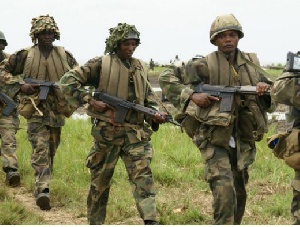The Ghana Armed Forces has denied claims of mass resignation over poor conditions of service.
According to GAF, every serviceman is at liberty to leave “whenever they want to” once the proper procedures are duly followed.
The statement from GAF follows recent media reports that soldiers are leaving the service due to poor treatment.
“It is important to note, while numbers are very important for the military, this may not play any significant role in the effectiveness of the Armed Forces, as numbers alone do not make the military either effective or efficient. You will recall that recently 501 new recruits were discharged from training after almost two months for misconduct. And over the last four to five years, over 2000 soldiers have been compulsorily retired after they had served their due with the colours.
"Between the period 2010 and 2015, a total of 194 all ranks retired voluntarily from GAF; while a total of 55 all ranks were absent without official leave (AWOL) during the same period. It is clear from the quoted figures that the allegation that mass resignations have hit GAF cannot be correct. It cannot also be considered as unprecedented,” the statement signed by Colonel Aggrey-Quashie, Director of Public Relations said.
Below is the full statement:
The attention of the Ghana Armed Forces (GAF) has been drawn to publications in the media with banner headlines reading: “Mass Resignations hit the Army… Commanders confused” and “Discontent hits Ghana Army” among others. The publications reported that the resignations may have been in reaction to what they termed the Ministry of Defence’s failure to heed to complaints about conditions of service and the mode of recruitment into the Ghana Armed Forces, among other reasons.
It is significant to point out that the Ministry of Defence (MOD) as well as GAF do not prevent any officer or man/woman from voluntarily leaving the Armed Forces. Any one is free to leave whenever they want, once the proper procedures are duly followed. It is the more reason why for instance, soldiers (that is, Other Ranks) have to formally re-engage to serve the Armed Forces every five years, until they reach the compulsory retiring years of service, (that is, 25 years). This is in one breath to afford the soldier the opportunity to continue to serve if he/she wishes to do so.
At least over the past ten years or so, no application for release/ retirement from GAF has been rejected. Troops do not have to tell lies to get released from the service with the military. They choose to join the military and they choose to leave whenever they want to.
It is important to note, while numbers are very important for the military, this may not play any significant role in the effectiveness of the Armed Forces, as numbers alone do not make the military either effective or efficient. You will recall that recently 501 new recruits were discharged from training after almost two months for misconduct. And over the last four to five years, over 2000 soldiers have been compulsorily retired after they had served their due with the colours. Between the period 2010 and 2015, a total of 194 all ranks retired voluntarily from GAF; while a total of 55 all ranks were absent without official leave (AWOL) during the same period. It is clear from the quoted figures that the allegation that mass resignations have hit GAF cannot be correct. It cannot also be considered as unprecedented.
Conditions of service in the military have seen tremendous improvement over the years. It is a fact that working conditions have improved with the retooling of the services and increase in professional and academic training of all ranks. The state has been making constant and consistent efforts to improve office and living accommodation, and providing other necessaries for all ranks. The Rank Based Salary Structure has tremendously increased the salaries and allowances of troops. It is nevertheless important to underscore the point that more effort will continue to be made to improve conditions of service of troops; the MOD and the Military High Command are dedicated towards pursuing a progressive development programme for the Armed Forces to position it for the 21st Century.
It is in line with this that GAF, from time to time, undertakes exercises to ascertain which areas of troops welfare and morale needs the immediate attention of the High Command. It is also important for any progressive institution to know at all times why its staff are resigning, abandoning post or proceeding on voluntary retirements for planning purposes as well as determine the retention rate and force projection levels at any time.
It must however, be noted, it is very significant for GAF to always have among its ranks well dedicated and motivated troops who are willing to live the oath of their service to the state, rain or shine, even to the peril of their lives. It should therefore be pointed out that no one who desires to leave the Armed Forces will be prevented from leaving. But as a disciplined institution, such voluntary resignations should be done in the proper manner.
The MOD and GAF therefore wish to take this opportunity, first, to thank those who have decided to voluntarily leave the Armed Forces after serving the state; and second, congratulate and commend those who have remained dedicated to service with the colours.
The Ministry and the Military High Command also assure the public and indeed all troops that they will help to address general issues confronting the Armed Forces aimed at improving its effectiveness, efficiency and relevance to enable it discharge its onerous responsibility of protecting the territorial integrity of our dear nation. The Ministry and the High Command pledge to continue to do what it will take to improve the living and working conditions of the troops as they continue to serve the state and the people of Ghana.
E AGGREY-QUASHIE
Colonel
Director Public Relations
General News of Friday, 5 February 2016
Source: starrfmonline.com













